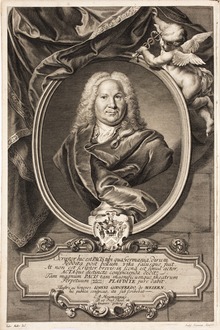Johann Gottfried von Miere

Johann Gottfried von Miere , also Meyern (born May 1, 1692 in Bayreuth , † October 21, 1745 in Hanover ) was a German lawyer, historian, university professor and archivist.
Life
Johann Gottfried (von) Mieren was the second son of the Margravial Privy Councilor Johann Simon (von) Mieren (1664–1721), who in 1715 was given by Emperor Charles VI. was ennobled. He attended the Christian-Ernestinum grammar school in Bayreuth and began studying law at the age of fifteen at the Universities of Halle and later in Leipzig. After completing his studies, he worked for several years for the Imperial Knight's Directorial Consultant Johann Friedrich Schober in Nuremberg in order to prepare himself professionally for the management of litigation as a trustee at the Imperial Court of Justice. 1715 he was at the University of Giessen Dr. PhD in both rights. In the following year he became a full professor of morals and, in 1718, extraordinary professor of law at the University of Giessen. As a staunch supporter of natural law , however, he came into conflict with his colleagues in Gießen, so that he returned to his hometown in 1720, entered the service of Margrave Georg Wilhelm von Bayreuth and from 1722 worked as a court advisor and court judge. In 1723 he was appointed Comes palatinus Caesareus (Count Palatinate). His defense of the Treaty of Hanover (1725) in 1726 published writing analysis Remarques sur l'du traité de Hanovre led in 1727 to his appointment to the Electorate of Brunswick-Lüneburg by King George I of Great Britain, who in personal union was Elector of Hanover. From 1729 until his death, he headed the archives of the electorate, now the Lower Saxony State Archives (Hanover location) , from 1740 as a Privy Councilor .
Mieren made a name for himself with numerous publications from the archives of the middle and smaller imperial estates . From 1734, his Acta pacis Westphalicae appeared in 50 volumes as an important legal-historical review of the Peace of Westphalia . In his expert opinion, he dealt with current constitutional and intergovernmental issues such as the Möllner Pertinenzien and played a significant role in the settlement of the dispute with the Hanseatic city of Lübeck, which was favorable for Kurhannover . His work was and is still today the basis for constitutional legal historians interested in the history of the Holy Roman Empire and its imperial estates.
Fonts
- Collection of some writings from the spiritual jurisdiction of the Catholic rulers in Germany over the Evangelical subjects in their countries, with a new deduction and response to Sinceri Collection of some writings from the spiritual jurisdiction of the Catholic rulers in Germany over the Evangelicals in their countries Subjects, with a new deduction and answer to Sinceri presumed refutation , Leipzig 1728
- Remarques sur l'analyse du traité de Hanovre , 1726
- Acata pacis Westphalicae , 50 volumes, 1734ff.
- Adami Adami, ... Actorum Pacia Westfalicae , Leipzig 1737
- Acta comitialia Ratisbonensia publica, or Regensburgische Reichstag actions and history from the years 1653 and 1654, describe , Leipzig 1738; 2nd part Göttingen 1740
- Illumination of the so-called Emblematum edirten to Regenspurg, by which the new edition of the Adami historia de pacioficatione Westphalica as the Acta pacis Westphalicae want to have made suspicious , Hanover, 1739
-
Preface to HF Avemann's full description of the Counts and Burgraves of Kirchberg in Thuringia , Frankfurt am Main, 1747
- and others verified in the Munich digitization center
literature
- von Meyer (Meyern), Johann Gottfried in: Georg Wolfgang Augustin Fikenscher: Gelehrtes Fürstentum Bayreuth: Or biographical and literary news from all writers who were born in the Principality of Baireut and who lived and still live in or outside of it: in alphabetical order. Maier to Otto , Volume 6, Palm, 1803, pp. 61-71
- Clemens Alois Baader : from Meiern (Johann Gottfried) : in all the writers who produced Bavaria in the 18th century, the learned Bavarians or encyclopedia or malnourished Volume 1: A - K . Seidel, Nuremberg and Sulzbach 1804
- Ferdinand Frensdorff : Mieren, Johann Gottfried von . In: Allgemeine Deutsche Biographie (ADB). Volume 21, Duncker & Humblot, Leipzig 1885, pp. 211-213.
- Michael Behnen : Mieren, Johann Gottfried von. In: New German Biography (NDB). Volume 16, Duncker & Humblot, Berlin 1990, ISBN 3-428-00197-4 , pp. 651 f. ( Digitized version ).
- Antje Oschmann: Johann Gottfried von Miere and the "Acta pacis Westphalicae publica". In: Heinz Duchhardt , Eva Ortlieb, Der Westfälische Friede. Diplomacy - political caesura - cultural environment - history of reception , HZ supplement 26, Munich 1998, pp. 780–801
Web links
- Mieren, Johann Gottfried von. Hessian biography. In: Landesgeschichtliches Informationssystem Hessen (LAGIS).
- Works by and about Johann Gottfried von Miere in the German Digital Library
Individual evidence
- ^ Thorough information from Dominio and Advocatia, or Herrschaft u., Pledged to the city of Lübeck in 1359. Vogtey Möllen , Fol 1740; Demonstration that the revision of the imperial laws interposed by Lübeck against the Judicatum camerale on June 18, 1741 did not take place , 1741. The dispute was settled in 1747, two years after von Mieren's death, in favor of Kurhannover. His Lübeck opponent, the Syndicus Johann Schaevius , had already died in 1743.
- ^ Peter von Kobbe : History and description of the country of the Duchy of Lauenburg. Altona 1837, p. 158 ff. In section The Möllner Trial. . ISBN 3-7777-0074-6
- ^ Munich digitization center
| personal data | |
|---|---|
| SURNAME | Mieren, Johann Gottfried von |
| ALTERNATIVE NAMES | Meyern, Johann Gottfried von |
| BRIEF DESCRIPTION | German lawyer, historian, university professor and archivist |
| DATE OF BIRTH | May 1, 1692 |
| PLACE OF BIRTH | Bayreuth |
| DATE OF DEATH | October 21, 1745 |
| Place of death | Hanover |
